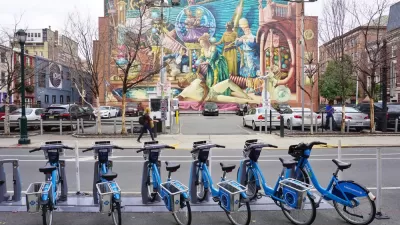Dockless bikes offer the unexpected and help users navigate and understand the urban environment in new and different ways.

In an excerpt from the new book The Urban Improvise: Improvisation-Based Design for Hybrid Cities, Kristian Kloeckl reflects on the role of dockless bike systems as part of the urban landscape. He looks at the changes in bikeshare program from Amsterdam’s White Bicycle Plan in the 1960s to today’s digital and highly connected networks.
Dockless bikes offer the openness and freedom to make new and more spontaneous travel decisions, says Kloeckl. "When you see a bike in plain sight or virtually on a digital map, you walk up to it, unlock it with your smartphone, and start riding it, to then leave it parked at any spot. It is a strength of the system that it is so inviting and easily accessible; people come up with new ways of integrating these bikes into their daily routines that they themselves did not consider before."
Dockless bikesharing is not without its issues — missing and abandoned bikes or bikes left outside of the system’s boundaries, for example. But this uncertainty is also what fuels the possibilities, argues Kloeckl.
"The dockless bike-sharing system is in constant flux. Bikes are parked in different locations all the time, and the system, in this way, is capable of adapting to changing conditions of traffic, housing, residency, and so on. Precisely because there are no predetermined docking stations, the parked bike locations remain relevant in the context of constantly changing urban conditions, as the locations are an expression of actual use," adds Kloeckl.
FULL STORY: Embracing the Improvisation of Dockless Bike-Share

Planetizen Federal Action Tracker
A weekly monitor of how Trump’s orders and actions are impacting planners and planning in America.

Maui's Vacation Rental Debate Turns Ugly
Verbal attacks, misinformation campaigns and fistfights plague a high-stakes debate to convert thousands of vacation rentals into long-term housing.

Cuomo Is the Candidate of Both NIMBYs and Developers. What Gives?
In the New York City mayoral race, odd bedfellows align to preserve the housing status quo.

San Antonio and Austin are Fusing Into one Massive Megaregion
The region spanning the two central Texas cities is growing fast, posing challenges for local infrastructure and water supplies.

Charlottesville Temporarily Has No Zoning Code
A judge ordered the Virginia city to throw out its newly revised zoning code, leaving permitting for new development in legal limbo.

In California Battle of Housing vs. Environment, Housing Just Won
A new state law significantly limits the power of CEQA, an environmental review law that served as a powerful tool for blocking new development.
Urban Design for Planners 1: Software Tools
This six-course series explores essential urban design concepts using open source software and equips planners with the tools they need to participate fully in the urban design process.
Planning for Universal Design
Learn the tools for implementing Universal Design in planning regulations.
Heyer Gruel & Associates PA
JM Goldson LLC
Custer County Colorado
City of Camden Redevelopment Agency
City of Astoria
Transportation Research & Education Center (TREC) at Portland State University
Jefferson Parish Government
Camden Redevelopment Agency
City of Claremont




























